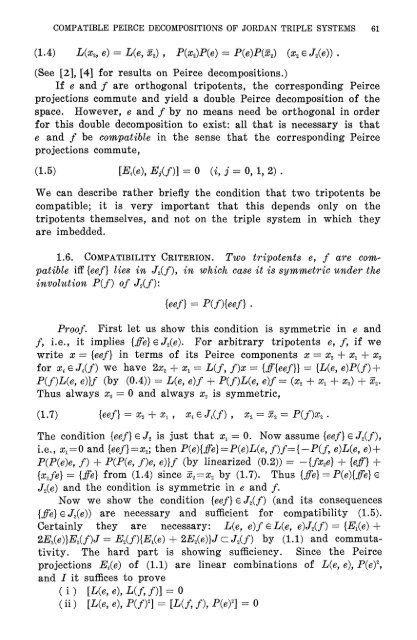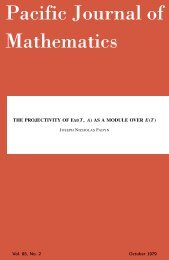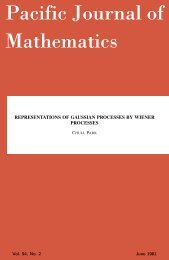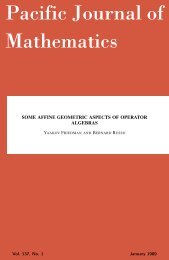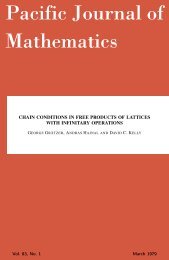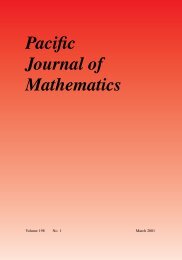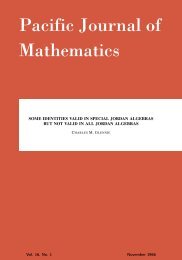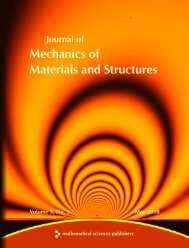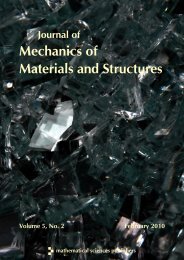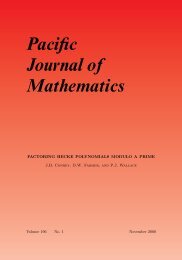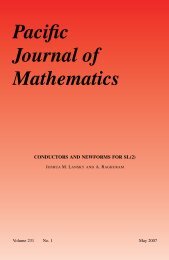Compatible Peirce decompositions of Jordan triple systems - MSP
Compatible Peirce decompositions of Jordan triple systems - MSP
Compatible Peirce decompositions of Jordan triple systems - MSP
You also want an ePaper? Increase the reach of your titles
YUMPU automatically turns print PDFs into web optimized ePapers that Google loves.
COMPATIBLE PEIRCE DECOMPOSITIONS OF JORDAN TRIPLE SYSTEMS 61<br />
(1.4) L(x 2 , e) = L(e, x 2 ) , P(x 2 )P(e) - P(e)P(x 2 ) (x 2 e J 2 {e)) .<br />
(See [2], [4] for results on <strong>Peirce</strong> <strong>decompositions</strong>.)<br />
If e and / are orthogonal tripotents, the corresponding <strong>Peirce</strong><br />
projections commute and yield a double <strong>Peirce</strong> decomposition <strong>of</strong> the<br />
space. However, e and / by no means need be orthogonal in order<br />
for this double decomposition to exist: all that is necessary is that<br />
e and / be compatible in the sense that the corresponding <strong>Peirce</strong><br />
projections commute,<br />
(1.5) [Ele\ E d(f)] = 0 (i, j = 0, 1, 2) .<br />
We can describe rather briefly the condition that two tripotents be<br />
compatible; it is very important that this depends only on the<br />
tripotents themselves, and not on the <strong>triple</strong> system in which they<br />
are imbedded.<br />
1.6. COMPATIBILITY CRITERION. TWO tripotents e, f are compatible<br />
iff {eef} lies in J 2(f), in which case it is symmetric under the<br />
involution P(f) <strong>of</strong> /?(/):<br />
{eef} = P(f){eef} .<br />
Pro<strong>of</strong> First let us show this condition is symmetric in e and<br />
/, i.e., it implies {ffe}eJ 2(e). For arbitrary tripotents e, f, if we<br />
write x = {eef} in terms <strong>of</strong> its <strong>Peirce</strong> components x = x 2 + x ί + x 0<br />
for x teJ 2 .<br />
The condition {βe/}e J 2 is just that x λ — 0. Now assume {ee/}e J 2 (/),<br />
i.e., ^ = 0 and {eef} = x 2 ; then P(β){Jfe}=P(e)Ir(β f /)/={-P(/, e)L(e, e) +<br />
P(P(e)e, f) + P(P(e, f)e, e)}f (by linearized (0.2)) = ~{fx 2 e} + {^#} +<br />
KM = {#β} from (1.4) since x 2 =x 2 by (1.7). Thus {ffe} = P{e){ffe} e<br />
J 2 (β) and the condition is symmetric in β and /.<br />
Now we show the condition {eef} 6 J 2 (f) (and its consequences<br />
{ffe}eJ 2(e)) are necessary and sufficient for compatibility (1.5).<br />
Certainly they are necessary: L(e, e)f e L(e, e)J 2{f) = {E λ(e) +<br />
2E 2(e)}E 2{f)J=E 2(f){E ι(e) + 2E i(e)y


